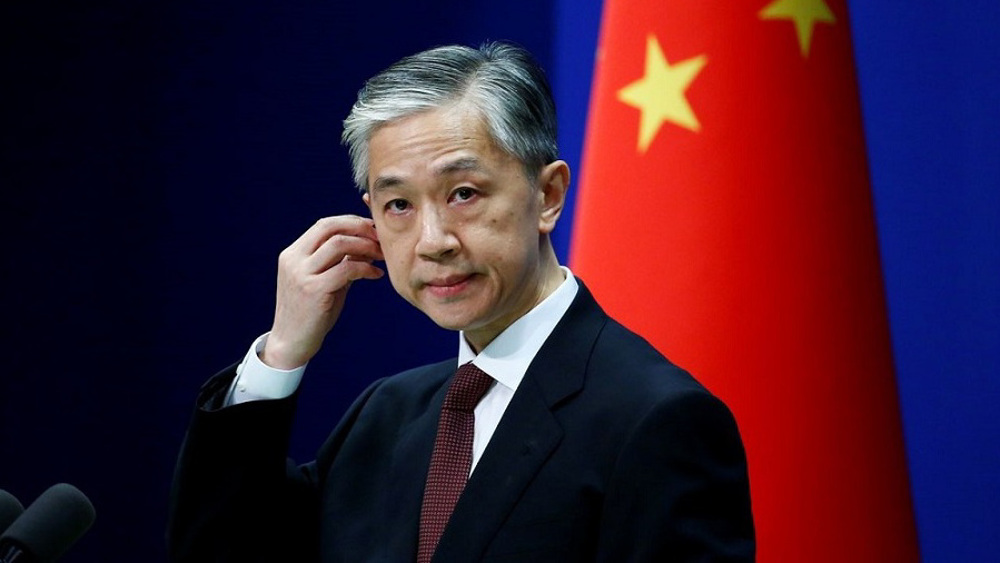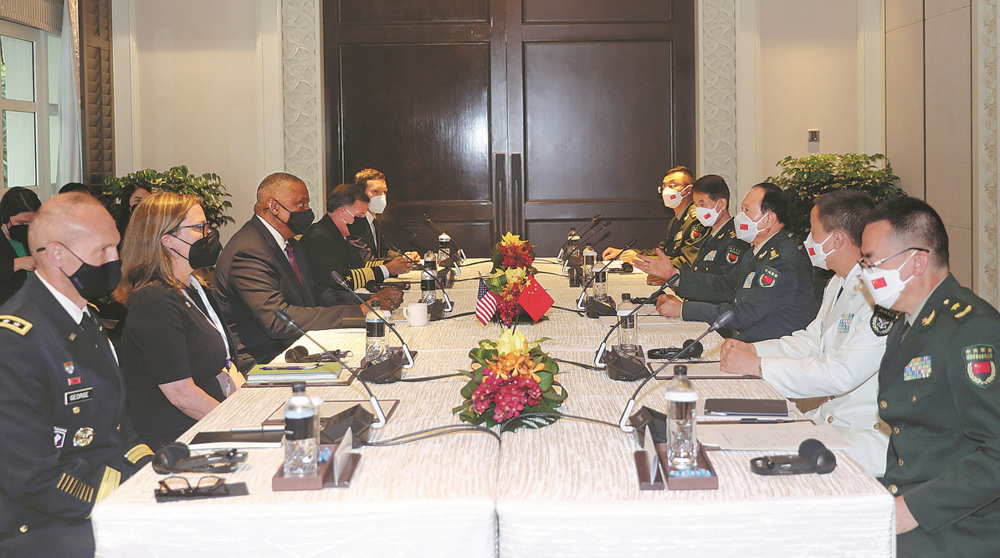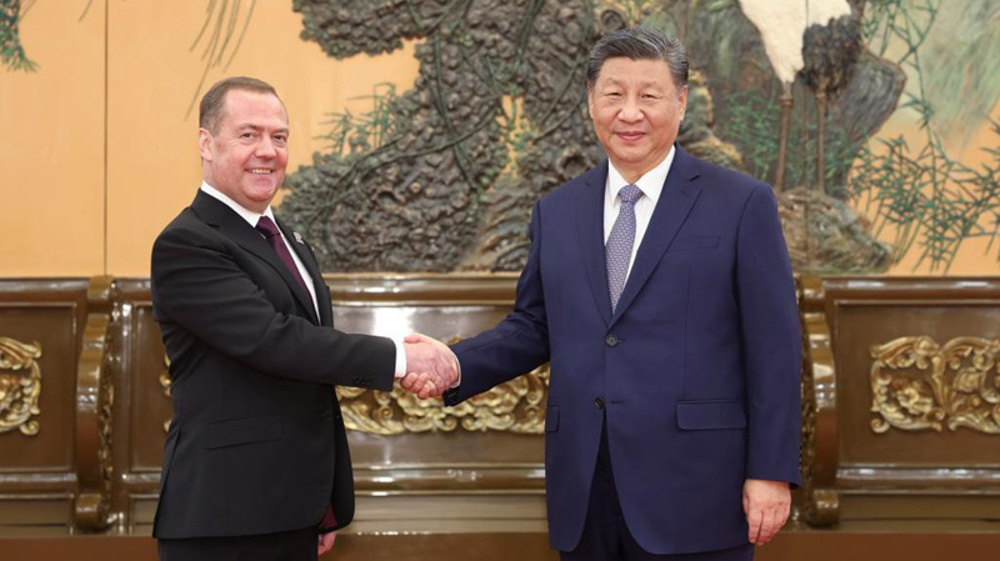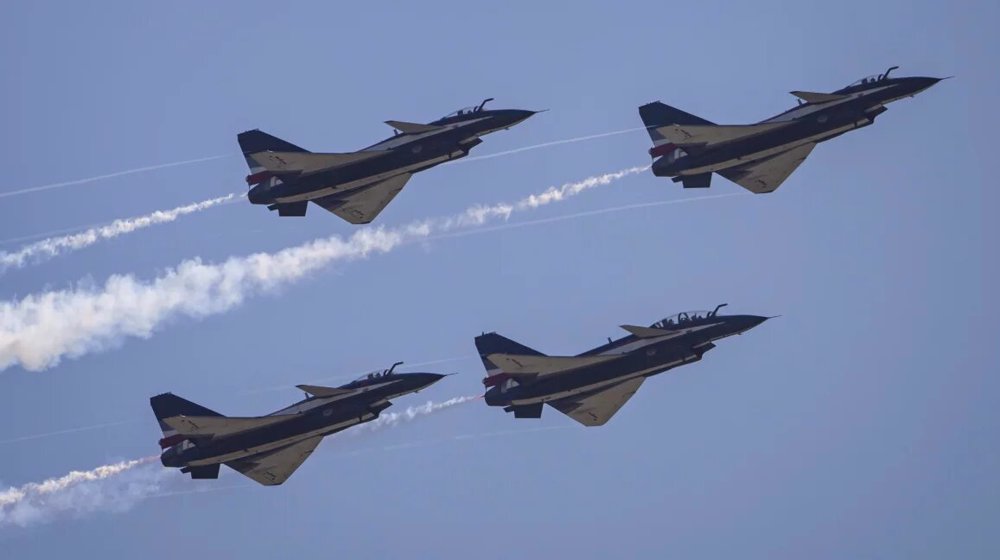Beijing says US shows its true hegemonic nature by spreading disinformation on China
Beijing says the United States is showing its “true hegemonic nature” by spreading disinformation against China and attempting to tarnish its image, amid heightened tensions between the two countries over the self-ruled Chinese Taipei.
Last week, US Defense Secretary Lloyd Austin met with Chinese State Councilor and Minister of National Defense Wei Fenghe and traded barbs at their first meeting on the sidelines of the annual Shangri-La Dialog security summit in Singapore.
Austin said Beijing must “refrain from further destabilizing actions toward Taiwan,” while his Chinese counterpart hit back, vowing that China would “fight to the very end … at all cost.”
Wei warned that China-US ties are at a critical juncture, stressing that his country has “no choice” but to fight if attempts are made to separate Taiwan from China. He also urged Washington to “stop smearing and containing China... stop interfering in China's internal affairs and stop harming China's interests.”
Under the “One-China” policy, almost all world countries recognize China's sovereignty over Taiwan. The US, too, recognizes the principle but has long courted Taipei in an attempt to unnerve Beijing. Furthermore, Washington, which backs Taipei’s secessionist president, also continues to sell weapons to the island in violation of its own stated policy.
On Monday, Chinese Foreign Ministry spokesman Wang Wenbin, at a press conference, denounced the US for its hegemonic nature, creating discord, and spreading anti-China disinformation.
“We noticed that the US Secretary of Defense Lloyd J. Austin said in his remarks at the Shangri-La Dialogue that China has adopted a more coercive and aggressive approach to its territorial claims in the East China Sea and the South China Sea, and the stakes are especially stark in the Taiwan Strait,” he said.
Austin “also said that the US remains committed to its one-China policy. The Chinese delegation attending the event has responded to Secretary Austin’s remarks. I would like to stress that by repeatedly spreading disinformation and painting an ugly picture of China, the US could only further expose its ill intention to sow discord and the true nature of its hegemonic practices and exercise of power politics,” Wang added.
China claims sovereignty over almost all of the South China Sea. Vietnam, the Philippines, Malaysia, Indonesia, Brunei, and Taiwan have competing claims. Beijing also claims sovereignty over most of the East China Sea where Japan and South Korea have competing claims.
China is particularly locked in a long-running territorial dispute with Japan over an uninhabited yet strategically important island group - known as Senkaku in Japan and Diaoyu in China – in the East China Sea.
Beijing accuses Washington, which sides with China’s rival claimants in the maritime disputes, of interfering in regional issues and deliberately stirring up tensions in the strategic waters of both seas.
“The biggest threat to the peace and stability across the Taiwan Strait does not come from elsewhere but the obdurate separatist activities of the ‘Taiwan independence’ forces and the US’ connivance and endorsement of such activities. It is the US that has sought to obscure and hollow out the one-Chine principle and kept backpedaling on its commitments," the Chinese Foreign Ministry spokesman said
He added, "It is the US that is relaxing restrictions on official interactions between the US and Taiwan and increasing the sales of weapons to Taiwan both in qualitative and quantitative terms. It is still the US that has been helping Taiwan expand the so-called international space and even acting openly to support Taiwan in ‘strengthening’ its so-called ‘diplomatic relationships.’ What could possibly be the US' aim for these actions other than to send wrong signals to the ‘Taiwan independence’ forces and undermine cross-Strait peace and stability?”
Wang also lambasted the US for being the biggest factor in fueling militarization in the Asia-Pacific and for deploying military aircraft and warships in the South China Sea regularly. He further denounced Washington for its reconnaissance aircraft often electronically mimicking the civil aircraft of other countries there.
“Not long ago, a US nuclear-powered submarine even hit an ‘uncharted seamount’ in the South China Sea. According to statistics from institutions with professional knowledge, the number of the US’ close-in military reconnaissance missions against China has more than doubled compared with a decade ago. Since the beginning of this year, the US naval ships have transited the Taiwan Strait once a month on average. US military aircraft have engaged in large-scope, frequent and provocative close-in reconnaissance to deter and pressure China. Apparently, ‘militarization’ and ‘endangering freedom of navigation’ are more accurate when used to describe the behavior of the US,” the Chinese foreign ministry spokesman added.
Wang stressed that the international community would not be deceived by Washington’s attempts to tarnish the image of China, emphasizing that the US would only damage its own credibility by such attempts.
“We urge the US to match its words with action, including not seeking confrontation or conflict, not seeking a new Cold War, and not seeking an Asian NATO or a region split into hostile blocs. We also urge the US to stop saying or doing things that could create division and confrontation,” he concluded.
Yemeni FM: Israel’s sponsors accountable for ongoing aggression on Sana’a
Eight Palestinians killed as Israel attacks Gaza school, hospitals
VIDEO | Rome, Milan host new protests in solidarity with Palestinians
Dec. 21: ‘Axis of Resistance’ operations against Israeli occupation
Spain jurists demand ties with Israel ties be cut
VIDEO | Press TV's news headlines
VIDEO | Iran honors top Science Olympiad medalists
VIDEO | Austrians arrested at Gaza protest in Vienna













 This makes it easy to access the Press TV website
This makes it easy to access the Press TV website